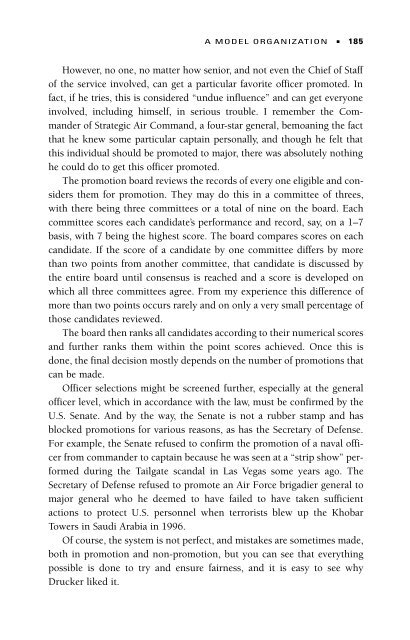A Class with Drucker - Headway | Work on yourself
A Class with Drucker - Headway | Work on yourself
A Class with Drucker - Headway | Work on yourself
You also want an ePaper? Increase the reach of your titles
YUMPU automatically turns print PDFs into web optimized ePapers that Google loves.
A MODEL ORGANIZATION ■ 185<br />
However, no <strong>on</strong>e, no matter how senior, and not even the Chief of Staff<br />
of the service involved, can get a particular favorite officer promoted. In<br />
fact, if he tries, this is c<strong>on</strong>sidered “undue influence” and can get every<strong>on</strong>e<br />
involved, including himself, in serious trouble. I remember the Commander<br />
of Strategic Air Command, a four-star general, bemoaning the fact<br />
that he knew some particular captain pers<strong>on</strong>ally, and though he felt that<br />
this individual should be promoted to major, there was absolutely nothing<br />
he could do to get this officer promoted.<br />
The promoti<strong>on</strong> board reviews the records of every <strong>on</strong>e eligible and c<strong>on</strong>siders<br />
them for promoti<strong>on</strong>. They may do this in a committee of threes,<br />
<str<strong>on</strong>g>with</str<strong>on</strong>g> there being three committees or a total of nine <strong>on</strong> the board. Each<br />
committee scores each candidate’s performance and record, say, <strong>on</strong> a 1–7<br />
basis, <str<strong>on</strong>g>with</str<strong>on</strong>g> 7 being the highest score. The board compares scores <strong>on</strong> each<br />
candidate. If the score of a candidate by <strong>on</strong>e committee differs by more<br />
than two points from another committee, that candidate is discussed by<br />
the entire board until c<strong>on</strong>sensus is reached and a score is developed <strong>on</strong><br />
which all three committees agree. From my experience this difference of<br />
more than two points occurs rarely and <strong>on</strong> <strong>on</strong>ly a very small percentage of<br />
those candidates reviewed.<br />
The board then ranks all candidates according to their numerical scores<br />
and further ranks them <str<strong>on</strong>g>with</str<strong>on</strong>g>in the point scores achieved. Once this is<br />
d<strong>on</strong>e, the final decisi<strong>on</strong> mostly depends <strong>on</strong> the number of promoti<strong>on</strong>s that<br />
can be made.<br />
Officer selecti<strong>on</strong>s might be screened further, especially at the general<br />
officer level, which in accordance <str<strong>on</strong>g>with</str<strong>on</strong>g> the law, must be c<strong>on</strong>firmed by the<br />
U.S. Senate. And by the way, the Senate is not a rubber stamp and has<br />
blocked promoti<strong>on</strong>s for various reas<strong>on</strong>s, as has the Secretary of Defense.<br />
For example, the Senate refused to c<strong>on</strong>firm the promoti<strong>on</strong> of a naval officer<br />
from commander to captain because he was seen at a “strip show” performed<br />
during the Tailgate scandal in Las Vegas some years ago. The<br />
Secretary of Defense refused to promote an Air Force brigadier general to<br />
major general who he deemed to have failed to have taken sufficient<br />
acti<strong>on</strong>s to protect U.S. pers<strong>on</strong>nel when terrorists blew up the Khobar<br />
Towers in Saudi Arabia in 1996.<br />
Of course, the system is not perfect, and mistakes are sometimes made,<br />
both in promoti<strong>on</strong> and n<strong>on</strong>-promoti<strong>on</strong>, but you can see that everything<br />
possible is d<strong>on</strong>e to try and ensure fairness, and it is easy to see why<br />
<str<strong>on</strong>g>Drucker</str<strong>on</strong>g> liked it.


